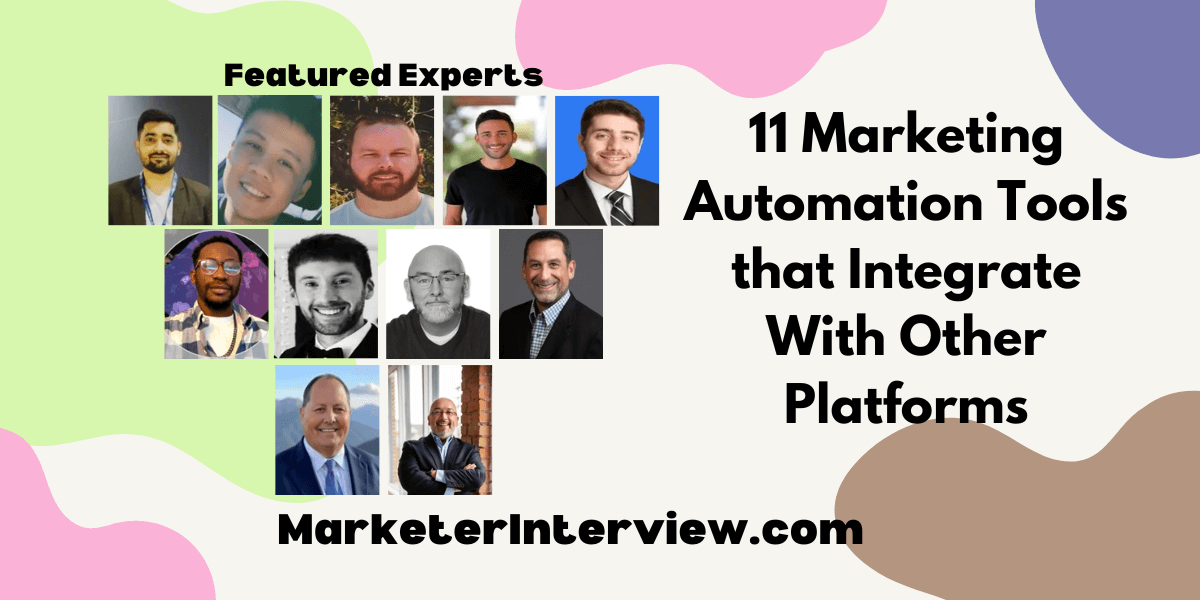11 Marketing Automation Tools that Integrate With Other Platforms
Ever wondered how top industry leaders streamline their marketing efforts with automation tools? In this article, discover insights from a founder and a Head of Marketing on the best platforms to integrate with other tools. Learn why one expert recommends Make.com for automating SEO tasks, while another swears by HubSpot for its comprehensive integration capabilities. With a total of eleven expert opinions, this Q&A post promises to enhance your marketing strategy with proven solutions.
Want to get quoted in MarketerInterview.com content just like this? Apply to become a contributor today!
Contents
- 1 Automate SEO Tasks with Make.com
- 2 Lean on Pardot for Seamless Integration
- 3 Qualify Leads with Zapier and ChatGPT
- 4 Connect Platforms Efficiently with Workato
- 5 Use Zapier and Segment for Automation
- 6 Automate Email Marketing with Zoho Campaigns
- 7 Integrate Marketing with Mailchimp
- 8 Leverage ActiveCampaign for Robust Automation
- 9 Enhance Workflow Efficiency with Zapier
- 10 Rely on Marketo for Advanced Integration
- 11 Choose HubSpot for Comprehensive Integration
Automate SEO Tasks with Make.com
I use Make.com to automate many things for my SEO work. I recommend Make, as you can create custom flows that hook into AI tools such as ChatGPT and Perplexity, and then Google Sheets and Google Docs.
This allows you to set up very specific automations that can reference custom GPT assistants and information within Google Docs/Sheets.
If there are detailed tasks you could possibly support with automation, such as data gathering and filtering, using Make automations may be a good one to test to see if you can streamline the process.
I’ve got some automations down to simply pasting a question into a Google Sheet; then the workflow does the rest of the heavy lifting, giving me a great output to work with. This output previously would have taken me far longer to compile.

Ben Poulton, Founder, Intellar SEO Consultancy
Lean on Pardot for Seamless Integration
As a committed CEO of a tech firm, I completely lean on Pardot as our marketing automation tool. The integration it provides with other platforms is absolutely seamless, exactly what you need for a fast-paced environment. It armors us with insightful data, helps us navigate through our marketing strategies, and needs minimal technical expertise to make the best use of. Pardot’s ease of use, successful data integration, and effective features make it my top recommendation for marketing automation.

Abid Salahi, Co-founder & CEO, FinlyWealth
Qualify Leads with Zapier and ChatGPT
We use Zapier with ChatGPT to qualify leads and route them to the right salesperson. ChatGPT handles the logic work, analyzing lead data, and ensuring every lead is sent to the right person. It’s a game-changer because it automates the tedious work, speeds up response times, and ensures no leads fall through the cracks. We get smarter lead distribution without adding more manual tasks.

Justin Silverman, Founder & CEO, Merchynt
Connect Platforms Efficiently with Workato
After testing dozens of automation tools while building WordPress plugins, I found Workato to be incredibly powerful for connecting different platforms without getting bogged down in custom coding. Just last month, I used it to automate our client-onboarding process, linking our payment system with our project-management tool, which cut our setup time from 2 hours to 15 minutes per client.

Joshua Odmark, CIO and Founder, Local Data Exchange
Use Zapier and Segment for Automation
Zapier and Segment are almost always an integral part of a business’s tech stack.
Zapier is essential for automating tasks between different web applications, which is especially useful for apps that don’t integrate with each other out of the box. This could be something like copying a new lead acquired from Meta ads into a custom Google Ads audience, or vice versa. Since Zapier users are billed based on the number of tasks per month, it can be very affordable and, therefore, commonly used among small brands.
As a business grows and its marketing strategy scales, data analytics and reporting become increasingly important. You need to have the full picture of all your marketing efforts to make informed business decisions, but this is challenging to do when your customer data is divided between multiple marketing channels. Segment solves this problem by collecting and managing customer data from multiple channels so that you can build reports on a single analytics platform like Google Analytics or Amplitude.

Kar Lo, Email Marketing Specialist, Lo Marketing Company
Automate Email Marketing with Zoho Campaigns
In our marketing operations, we use Zoho Campaigns to automate our email-marketing efforts. We have integrated Zoho Campaigns with all our lead-generation sources, such as our website, Meta Ads, Crisp Live Chat Plugin, and many more.
By integrating Zoho Campaigns with these sources, leads are automatically added to the preferred list, and automated emails are then sent to those leads. Without this integration, there is a significant risk of missed leads. Therefore, it’s recommended to integrate automation tools with all your platforms.

Shubham Ahuja, Digital Marketing Manager, BigOhTech
Integrate Marketing with Mailchimp
I often use Mailchimp for integrating marketing automation across diverse platforms. During a campaign with law firms, I found Mailchimp’s seamless integration with CRM systems like Salesforce crucial in synchronizing client interactions. This led to a 40% increase in client retention and custom messaging that spoke directly to the client’s needs.
Mailchimp’s robust analytics and automation capabilities helped in fine-tuning our SEO strategies. By analyzing audience behavior and integrating with Google Analytics, we saw a 25% uptick in qualified leads over three months. The platform’s flexibility in customizing automated workflows was key to driving these results.
In the digital-marketing field, utilizing Mailchimp allows businesses to automate processes while maintaining a personal touch. Its ability to segment audiences effectively and integrate with social media channels improves the overall marketing strategy, yielding tangible business growth.

Robert Portillo, CEO, and Founder, 12 Adaptive Marketing
Leverage ActiveCampaign for Robust Automation
We leverage ActiveCampaign for our marketing automation to integrate seamlessly with other platforms. This choice is driven by its robust email-marketing capabilities and powerful automation features that improve client acquisition and engagement. Our experience shows that ActiveCampaign excels in automating workflows, optimizing customer journeys, and enhancing CRM functionalities.
A standout example was a campaign where we integrated ActiveCampaign with a client’s e-commerce platform. This integration enabled us to automate personalized email follow-ups based on customer behavior, which resulted in a 35% increase in conversion rates within months. Automating these processes allowed us to maintain high engagement and drive substantial revenue growth efficiently.
ActiveCampaign’s ability to provide detailed analytics helps us make informed decisions, optimizing strategies based on real-time data. Our clients have noted the significant impact on their operational efficiency, enabling more targeted marketing and better customer segmentation. The ease of integration and scalability make it a preferred choice for businesses looking to improve their digital marketing infrastructure.

Dan O’Keeffe, Owner, SPX Marketing LLC
Enhance Workflow Efficiency with Zapier
When it comes to integrating marketing-automation tools, I highly recommend using Zapier. We rely on Zapier to connect various digital-marketing applications and automate repetitive tasks, enhancing our workflow efficiency. For instance, integrating our client’s CRM with Google Analytics through Zapier has provided seamless data transfer, enabling real-time insights without manual input.
Zapier’s ability to connect over 2,000 apps means that customization and flexibility are at your fingertips. For example, we used Zapier to automate lead-generation processes for a client with multiple retail locations, allowing leads from different platforms to funnel into a single dashboard, increasing lead-response times by 40%.
In my experience, balance automation with personalization for effective marketing. While Zapier streamlines many processes, we ensure client campaigns maintain a personal touch by regularly reviewing automated workflows and making data-driven adjustments that reflect each client’s unique needs. This strategy ensures we maintain high service quality while scaling operations efficiently.

Lane Houk, Managing Partner, Quantum Agency
Rely on Marketo for Advanced Integration
I rely on Marketo for marketing automation and integration across platforms. Its robust capabilities and scalability make it an ideal choice for businesses of all sizes. Marketo’s strength lies in its advanced lead management and nurturing features, allowing for sophisticated, multi-touch attribution modeling.
What sets Marketo apart is its seamless integration with CRM systems, particularly Salesforce, enabling a holistic view of the customer journey. The platform’s intuitive, drag-and-drop interface for creating complex workflows and campaigns is a significant time-saver.
Marketo’s analytics and reporting tools provide deep insights into campaign performance, helping optimize marketing strategies in real-time. While the initial setup can be complex, the platform’s flexibility and customization options make it adaptable to various industries and marketing needs.

Nick Follows, Head of Marketing, ID Card Centre
Choose HubSpot for Comprehensive Integration
One highly-recommended marketing automation tool is HubSpot. Here’s why it stands out for integration with other platforms:
1. Comprehensive Integration Capabilities:
- Wide Range of Integrations: HubSpot seamlessly integrates with a variety of platforms, including CRM systems (like Salesforce), social media platforms (like Facebook and LinkedIn), email marketing tools, and e-commerce solutions (like Shopify).
- API Access: For companies needing custom integrations, HubSpot offers robust API access, allowing for tailored solutions that fit specific business needs.
2. User-Friendly Interface:
- Intuitive Design: HubSpot’s interface is easy to navigate, making it accessible for users of all skill levels. This simplicity enhances productivity and reduces the learning curve for teams.
3. All-in-One Solution:
- Unified Platform: HubSpot combines CRM, marketing, sales, and customer service functionalities in one platform, ensuring a cohesive approach to managing customer interactions.
- Cross-Platform Data Syncing: The ability to sync data across various tools helps maintain consistency and provides a comprehensive view of customer journeys.
4. Advanced Marketing Features:
- Automation Capabilities: HubSpot offers robust marketing automation features, including email campaigns, lead nurturing workflows, and task automation, which help streamline marketing efforts.
- Analytics and Reporting: Built-in analytics tools provide insights into campaign performance, helping teams make data-driven decisions and optimize their marketing strategies.
5. Strong Support and Community:
- Resources and Training: HubSpot offers extensive documentation, tutorials, and customer support, ensuring users can leverage the platform effectively.
- Community Engagement: A vibrant community and HubSpot Academy provide opportunities for learning and sharing best practices among marketers.
I recommend HubSpot for its ease of use, extensive integration capabilities, and comprehensive marketing automation features, making it an excellent choice for businesses looking to enhance their marketing efforts through effective platform integration.

Eric Amoh, Data Scientist, Amoheric
Want to get quoted in MarketerInterview.com content just like this? Apply to become a contributor today!






